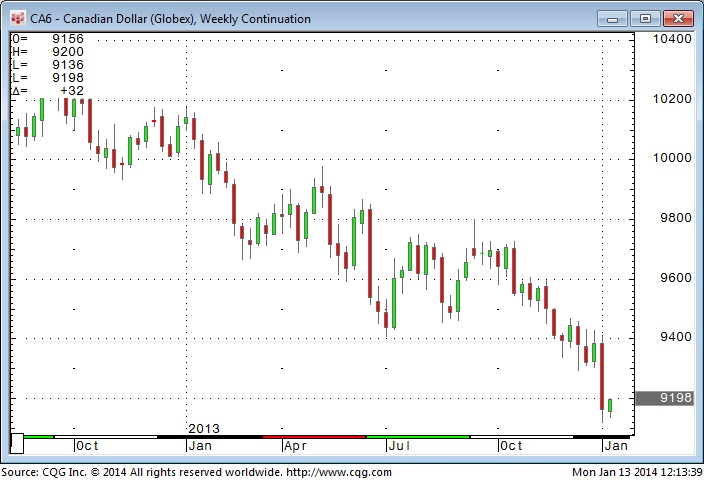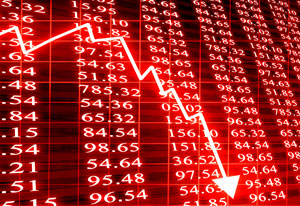Currency
Is the Canadian Government secretly happy that the Canadian Dollar has been the world’s weakest currency so far this year? David Rosenberg (www.gluskinsheff.com) seems to think so…David had been very bullish on the CAD as recently as last fall…and he remains long-term bullish on the CAD…but last week he wrote that he thinks there was a political decision made over a year ago…at the highest levels in Ottawa…to lower the value of the CAD. This political decision lead to the appointment of Stephen Poloz to replace Mark Carney as head of the BOC…instead of Tiff Macklem, the BOC insider who was the presumed front-runner for job.
I think that the big rally in the CAD over the last 10 years…from the 60-70 cent level to around par…was seen by our government as too much / too fast for the Canadian economy (especially in Quebec and Ontario) to digest and that Canada has quietly joined the long list of countries that are purposely trying to gain a competitive advantage through a lower currency. I should have realized that Stephen Poloz’s surprise appointment last year signaled a political sea-change given that he was widely seen to be sympathetic to the problems of Canadian exporters.
Last week the CAD traded with a 9100 handle…down ~14% from the 1.06 highs it reached in 2011…a decline that was broadly in sync with falling commodity prices. However, last week’s lower CAD was odd given that both the AUD and NZD…the other two commodity currencies…rose against the USD. Perhaps the recent comments on the CAD by finance minister Jim Flaherty…together with the much-weaker-than-expected Canadian employment report were enough to drive the CAD to 4 ½ year lows against the USD and 3 year lows against the EUR…the CAD has fallen ~23% against the EUR in the last 18 months…which might reduce the flow of Canadian tourists headed for Europe…but increase the flow of European tourists headed for Canada!
Trends are particularly powerful in the currency markets:
I’ve been trading currencies for 35 years and I’ve noticed that once a currency starts trending it can go WAY further than seems to makes any sense. One reason for this is what we used to call “Leads and Lags” which meant that import/export businesses that benefited from a falling currency tended to “go slow” implementing their conversions or hedging operations while those businesses that suffered from a falling currency tended to “speed up” or bring forward their conversions or hedging operations. These activities help to reinforce existing trends…and the more a currency trends the more businesses will behave in this manor…creating a self-reinforcing loop.
Speculators like to jump on trends in the currency markets:
Most of the huge daily volume in the currency markets comes from speculators…not from import/export businesses…and in the currency markets many of the speculators are trend followers…adding to the self-reinforcing trend aspect of the currency trends. Over the years I’ve observed that currency trends usually end with a “V” shaped reversal…that is, they run way too far in one direction (as speculators “pile on”) and then “turn on a dime” and go the other way (as speculators “bail out.”)
No short term market arbitrage to reign in a run-away currency:
Another consideration that adds to the “overshooting” aspect of currency values is that there is no short term “substitution” or “arbitrage” effect that can “reign in” a runaway currency. For instance, if the price of coal gets way too high relative to the price of natural gas, or vice versa, then power generating businesses will try to switch from the expensive fuel to the cheaper fuel…thereby reducing the demand, and likely the price, of the higher priced commodity. This kind of switch or substitution isn’t as readily available in the currency world to act as a natural brake on a run-away currency. For instance, an American business that buys CAD to pay for products or services from Canada will have no choice (at least in the short term) but to continue buying CAD to pay for those products or services…no matter how high the CAD rises…they cannot pay for those products or services with Euros or British Pounds. Obviously, on a longer term time frame, changes in currency values produce important swings in buyer behavior…the Japanese are obviously hoping that the sharp decline in the Yen over the last 18 months will make their exports more attractive than those made by their competitors.
Huge Short Position Building in the CAD:
Huge speculative short positions have been building against the CAD in the futures markets over the past few months. While the futures markets are much smaller than the OTC inter-bank market they are thought to reflect the same kind of positioning. All serious CAD traders are aware of these unusually large short positions and understand that if the CAD starts to rise then short-covering could goose the CAD sharply higher.. But the CAD bears have been adding to their short positions…not covering them…and if the idea that the Canadian government wants to see a lower currency gains any “traction” in the marketplace then the CAD bears may become even more aggressive.
Weekly CAD Chart:


Something big is looming…
I know you’ve felt it in the pit of your stomach… that feeling that the market is going up for all the wrong reasons — and will soon come crashing down yet again.
It’s a crisis that I suspect could happen within the next 12 months, maybe much sooner — based on my research, which I’d like to share with you and other like-minded people.
The fact of the matter is with $17 trillion in debt, the U.S. government can no longer sustain itself like it has without implementing drastic measures… ones that will make the austerity measures going on in Europe right now look like a springtime walk in the park.
 Government shutdown? Check.
Government shutdown? Check.
Spying on our citizens and allies? Check.
Bursting stock bubble? That’s next.
And I’m not the only one saying this…
- Financial expert Marc Faber recently stated he “loves the high odds of a ‘big-time’ market crash.”
- Economist Nouriel Roubini has said we should “prepare for a perfect storm.”
- Pimco’s Bill Gross stated we are heading for a “credit supernova.”
- Nomura’s Bob Janjuah believes the financial markets will experience “one more huge spike before collapsing by up to 50%.”
Are you prepared?
A Berkshire Hathaway director has already flat-out proclaimed stocks are in “a bit of a bubble.”
CNBC — the biggest cheerleader of them all — has even said the market is flashing “overbought” signals. And team cheerleading captain Jim Cramer has even urged investors to abandon the dollar “immediately” because the U.S. is a “laughingstock.”
The signs are everywhere.
Peter Schiff says, “We have a dollar crisis coming, a bond market collapse coming.”
Hank Paulson says another financial crisis is a “certainty.”
When it happens, it’ll happen fast. And most people will be caught completely off-guard and unprepared.
Don’t be one of them.
It’s something I’ve been researching for the past several years now, and I’ve finally seen all the warning indicators shift us into “High Alert Status.”
Don’t believe me?
Let me show you what I mean… and how to protect yourself, your loved ones, and your finances.
Call it like you see it,
![]()
Nick Hodge

Canadian employment fell by 46,000 in December, the result of declines in full-time work. The unemployment rate rose 0.3 percentage points to 7.2% as more people searched for work. This was the worst report since March of 2013.
The Canadian Dollar continues its fall down to 91.20 from 93.85 at the start of the year.
Drew Zimmerman
Investment & Commodities/Futures Advisor
604-664-2842 – Direct
604 664 2900 – Main
604 664 2666 – Fax
800 810 7022 – Toll Free

The Canadian Dollar reached lows we have not seen since November 2, 2009. We are now at 4 YEAR lows on Canadian Dollr vs the US Dollar.
This is a decline of over 2% this year, and we are only 9 days in. The decline from the highs in mid 2012 have been almost 13%. These are considerable moves considering we had $616 billion in trade with the US in 2012.
Drew Zimmerman
Investment & Commodities/Futures Advisor
604-664-2842 – Direct
604 664 2900 – Main
604 664 2666 – Fax
800 810 7022 – Toll Free

 Economist John Williams thinks 2014 will mark the beginning of hyperinflation. Williams contends, “You are going to see, early on, a crisis in the dollar that will start to trigger the inflation . . . as the inflation picks up, that’s going to savage the economy, which is already in a depression. It never recovered.” Forget what you have heard about the so-called recovery. Williams says, “The consumer is in trouble. There is nothing happening to turn the economy around.” The weak economy is bad news for the dollar. According to Williams, “Anything that would suggest deficit deterioration here, and a weak economy would do that, will have a devastating impact on the dollar.” And if foreigners start selling some of the 12 trillion U.S. dollar based assets, such as bonds and currency, things will turn ugly fast. Williams says, “We’re dependent on the rest of the world continuing to go along with us and continue to support the dollar. That’s not going to happen.” So, the big question everyone is asking is when will the buck take a hit in value? Williams says the dollar will likely begin selling off before the middle of this year, and he adds, “It’s really going to be a currency panic . . . when the fundamental selling pressure really starts to pick up, when the selling gets heavy . . . in turn, the weakness will be seen in a spike in oil prices and a spike in gasoline prices.” Williams says there will be a panic out of the dollar and he predicts,“Once you see a massive sell-off here, I see the game as being over.” Join Greg Hunter as he goes One-on-One with John Williams of Shadowstats.com.
Economist John Williams thinks 2014 will mark the beginning of hyperinflation. Williams contends, “You are going to see, early on, a crisis in the dollar that will start to trigger the inflation . . . as the inflation picks up, that’s going to savage the economy, which is already in a depression. It never recovered.” Forget what you have heard about the so-called recovery. Williams says, “The consumer is in trouble. There is nothing happening to turn the economy around.” The weak economy is bad news for the dollar. According to Williams, “Anything that would suggest deficit deterioration here, and a weak economy would do that, will have a devastating impact on the dollar.” And if foreigners start selling some of the 12 trillion U.S. dollar based assets, such as bonds and currency, things will turn ugly fast. Williams says, “We’re dependent on the rest of the world continuing to go along with us and continue to support the dollar. That’s not going to happen.” So, the big question everyone is asking is when will the buck take a hit in value? Williams says the dollar will likely begin selling off before the middle of this year, and he adds, “It’s really going to be a currency panic . . . when the fundamental selling pressure really starts to pick up, when the selling gets heavy . . . in turn, the weakness will be seen in a spike in oil prices and a spike in gasoline prices.” Williams says there will be a panic out of the dollar and he predicts,“Once you see a massive sell-off here, I see the game as being over.” Join Greg Hunter as he goes One-on-One with John Williams of Shadowstats.com.











